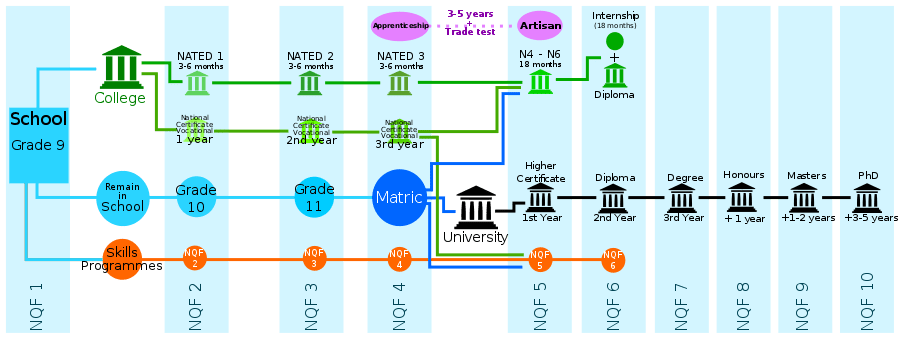
If you have a talent for designing, building and creating and you enjoy technical and analytical challenges, then the option to study Engineering after the GED may suit you well.
As the Berea Group of Colleges’ (listed below) website explains “Engineers are master innovators who come up with new ideas and concepts to advance structures, machinery and processes. Engineers bring about creative and practical solutions to our everyday lives and a career in this field can open many doors in the current job market. Skilled engineers apply scientific and mathematic skills, often with the use of computers, technical drawings or blueprint reports to analyse designs, monitor the quality of a product and control efficiency of processes.”
Always check the admission requirements for the course/s of your choice, as each institution’s requirements may vary. Usually, a GED is accepted for admission to a higher certificate or diploma course. A GED plus a higher certificate qualification is required for admission to a bachelor’s degree, in accordance with the legal requirements set by Universities South Africa (USAf).
The gazetted requirements for university admission are outlined on our University page. In general, private institutions of higher education are much more welcoming to students with a GED than the public universities in South Africa and so we have researched and listed them below.
There may also be opportunities to study Engineering at public universities. Please contact us if you discover options we don’t have listed below, so that we can provide more useful information to GED students.
In the field of engineering there are various pathways to useful qualifications. Some involve occupational training while others are more academic higher education qualifications. Be sure to explore the types of courses offered – the duration, cost and type of end qualification you will receive.
Understanding Qualifications Terminology
What are Occupational Qualifications (OQs)?
Occupational Qualifications are geared towards a specific occupation or job role and they are typically linked with vocational and skills training. OQs are developed by the Quality Council for Trades and Occupations (QCTO) and are designed to ensure that individuals are job-ready upon completion. Courses in this category may be described as any of the following: National N Diploma Courses, Trade Courses, Occupational Diploma Courses and Occupational Certificate Courses.
To understand the difference between a National Diploma and a National N Diploma (both of which are at NQF Levels 4, 5 and 6) refer to this external article (link above).
What are Higher Education Qualifications (HEQs)?
HEQs are traditional academic qualifications offered by universities, technikons, and other tertiary institutions. They range from undergraduate diplomas and degrees to postgraduate master’s and doctoral degrees. In South Africa, the Council on Higher Education (CHE) is responsible for ensuring the quality of these programs.
The National Qualifications Framework
The diagram below illustrates the ten levels of South Africa’s National Qualifications Framework. Matric and the GED are at NQF Level 4. Some of the colleges listed below offer courses described as N1, N2, N3 etc. These are vocational courses at NQF level 2, 3 and 4. These are artisan or trade skills which you can see in the top rows of the chart below.

The seven colleges below are divided into two groups, according to the type of courses they offer, either (1) occupational qualification or (2) higher education qualifications. Within each group, they are listed in no particular order:
1. Occupational Qualifications in Engineering
1.1 Berea Group of Colleges in Durban offers a range of National N Diploma Courses, Trade Courses, Occupational Diploma Courses, and Occupational Certificate Courses in the following categories:
National Diploma (NQF 5)
- Chemical Engineering
- Civil Engineering
- Mechanical Engineering
- Electrical Engineering (Heavy Current)
- Electrical Engineering (Light Current)
Occupational Diploma Courses
- Architectural Draughting Diploma (NQF 6)
- Analytical Chemistry Diploma (NQF 6)
- Construction Technology: Civil Engineering (NQF 6)
1.2 Technicol SA College is a private college that aims to offer exceptional quality education and to maintain standards that are not inferior to standards of comparable public Technical and Vocational Education and Training (TVET) institutions.
At Technicol SA College, you can study towards a wide range of engineering subjects that will earn you a Diploma (together with the relevant practical) issued by the Department of Higher Education and Training and regulated by the Quality Council for Trades and Occupations (QCTO). Technicol’s website states that “Foreign students’ qualifications must be evaluated by SAQA.”
They offer courses in Electrical, Electronical, Mechanical, and Civil Engineering up to NQF level 6.
1.3. The Academic Institute of Excellence offers courses in Engineering and Science and it seems they also offer a foundation course as a bridging programme. They also offer Occupational Certificates, National N Diploma and Diploma (NQF 6) courses in the following fields of Engineering:
- Higher Certificate in Project Management NQF 5
- Construction Management
- Mechanical Engineering
- Electrical Engineering
- Chemical Engineering
- Civil Engineering
- Higher Certificate in Architectural Technology NQF 5
- National Diploma: Structural Steelwork Detailing
1.4 Soltech “is ‘n private beroepsopleidingskollege in Pretoria wat jongmense uitstekend vir hul toekoms voorberei. Gehalte onderrig, in Afrikaans.” Soltech runs various artisan courses and offers an NQF Level 5 Occupational Certificate in Mechatronics.
1.5 Polytech Africa
Polytech Africa with your GED diploma for an Occupational Higher Certificate in Mechatronics as well as many other short courses in the technological field such as Robotics, Industrial Electronics, Introduction to Industrial Networks, Scada, Human Machine interfacing and more.
2. Higher Education Qualifications in Engineering
A number of institutions in the IIE group offer higher certificate and/or degree courses in Engineering:
2.1. Varsity College offers a Bachelor’s Degree in Civil Engineering
They don’t seem to have admission requirements on their website, so you should contact them to find out the pathway. These private institutions are bound by the same laws for admission requirements to degree courses as public universities, but they usually accept GED students for an NQF 5 level course (higher certificate) and then allow admission to degree courses thereafter. However, each faculty at each institution may set their own admission requirements, over and above the minimum legal requirements, set by USAf (Universities South Africa).

2.2 Rosebank College offers a Higher Certificate in Construction and Engineering Drafting
Their admission requirements document states that “Candidates with a GED qualification may be admitted if they have a SAQA Certificate of Evaluation with NQF L4 equivalence, as well as [a] minimum score of 145 out of 200 for all 4 GED subjects.” One might assume that the entrance criteria would be the same at the IIE other colleges, but always check!
2.3. IIE MSA is another educational brand of The Independent Institute of Education. They offer a Bachelor of Engineering in Electrical and Electronic Engineering, a Bachelor’s Degree in Civil Engineering and Bachelor’s degree in Mechanical Engineering.
University exemption is required for admission but they state that students with a Higher Certificate may be accepted via their “alternative admission”:
“A cognate Higher Certificate OR any cognate 240 credit Diploma OR an Advanced Certificate OR 360 credit Diploma OR Degree Or an appropriate IIE MSA Foundation Programme may satisfy the minimum admission requirements to degree studies.
Please note, requirements for entry to this qualification are correct at the time of publication, however, these may change.”
More information and the closing date for applications can be found on their website. (October 2025)
Important
To avoid disappointment, always check the accreditation status of the institute at which you intend to enrol and also check that the course you study has the required accreditation status for the purpose you intend to use it. Contact the institution itself to request registration and accreditation information or contact SAQA – or both! As an example:
In 2024, the Department of Higher Education and Training cancelled the registration of four Educor institutions four institutes of higher education and training because they failed to submit proof of their financial viability to the department: the four institutions were City Varsity (Pty) Ltd, Damelin (Pty) Ltd, Icesa City Campus (Pty) Ltd and Lyceum College (Pty) Ltd.
Check this article too as there may be other options to explore where you can study in the field of engineering – Where Do GED Graduates Study?
*SAQA (the South African Qualifications Authority) has evaluated the GED® and found the National Senior Certificate as its closest comparable qualification. As with any kind of matric or high school credential, there is no guarantee that a GED® graduate will be granted exemption from USAf, nor that a university will accept his/her application, as there may be other selection criteria too. Read more here: University with a GED® and read our GED Success Stories.
Disclaimer: Although every effort has been taken to provide accurate, up-to-date and correct information, Go Prep™ (previously Online GED Prep) shall never be liable for losses or other damages that may result from inaccuracy or incompleteness of information on this website about universities and their requirements.
